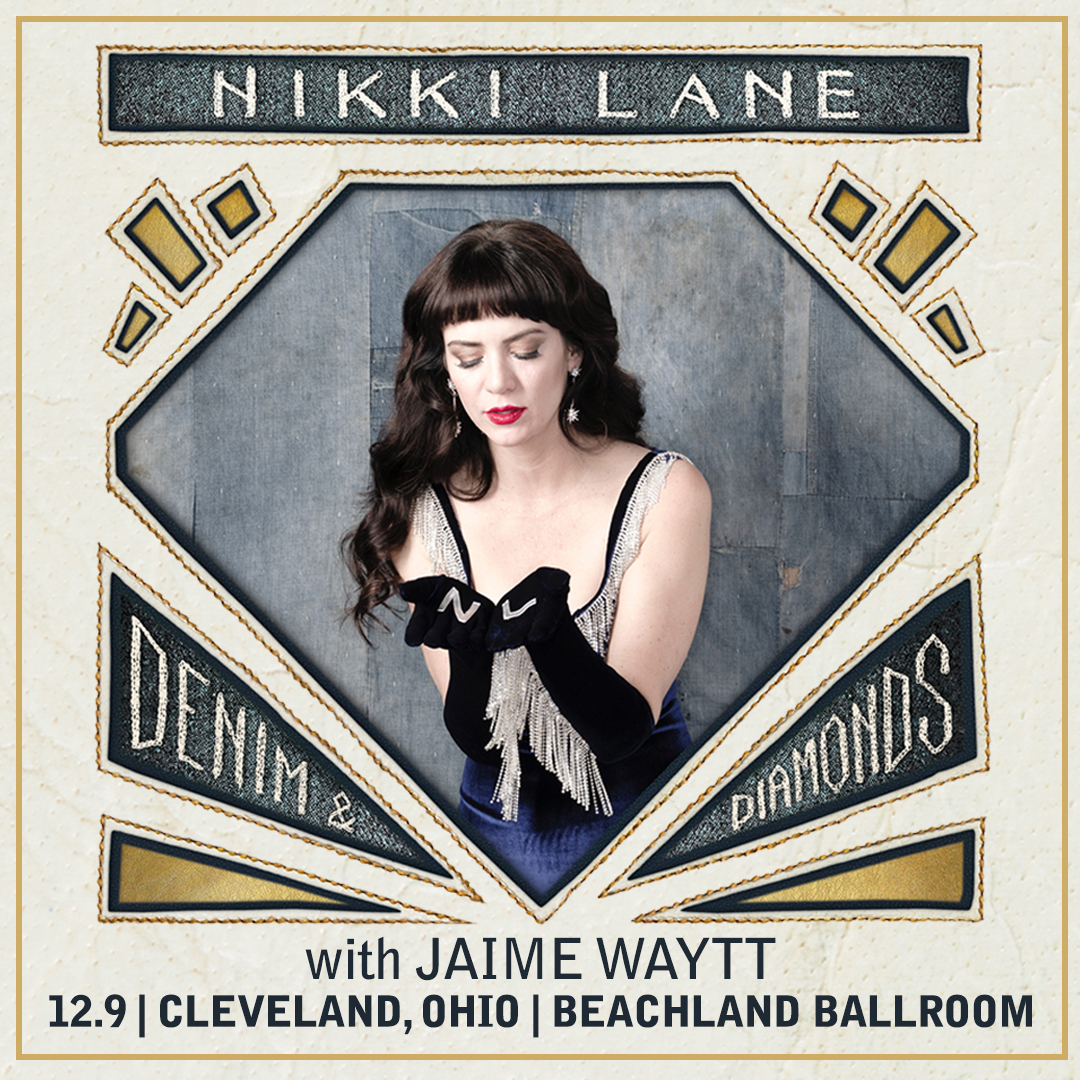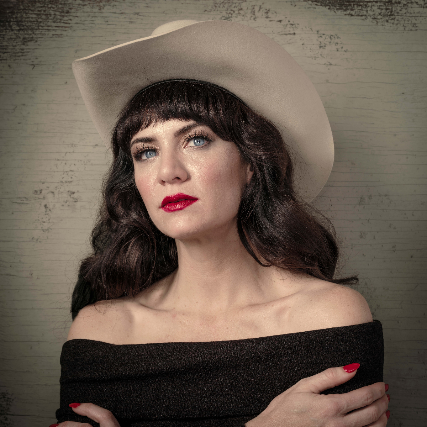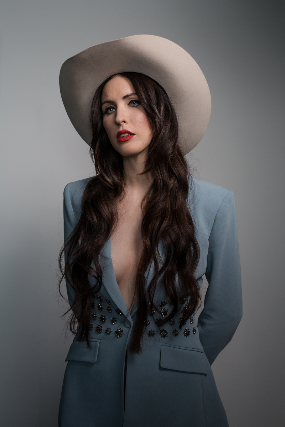
Nikki Lane
with Jaime Wyatt
Nikki Lane's stunning third album Highway Queen sees the young Nashville singer emerge as one of country and rock's most gifted songwriters. Co-produced by Lane and fellow singer-songwriter, Jonathan Tyler, this emotional tour-de-force was recorded at Matt Pence's Echo Lab studio in Denton, Texas as well as at Club Roar with Collin Dupuis in Nashville, Tennessee. Blending potent lyrics, unbridled blues guitars and vintage Sixties country-pop swagger, Lane's new music will resonate as easily with Lana Del Rey and Jenny Lewis fans as those of Neil Young and Tom Petty.
Highway Queen is a journey through heartbreak that takes exquisite turns. The record begins with a whiskey-soaked homage to Lane's hometown ("700,000 Rednecks") and ends on the profoundly raw "Forever Lasts Forever," where Lane mourns a failed marriage -- the "lighter shade of skin" left behind from her wedding ring. On "Forever" and the confessional "Muddy Waters," Lane's lyrics align her with perceptive songwriters like Nick Lowe and Cass McCombs. Elsewhere, "Companion" is pure Everly Brothers' dreaminess ("I would spend a lifetime/ Playing catch you if I can"). She goes on a Vegas bender on the rollicking "Jackpot," fights last-call blues ("Foolish Heart") and tosses off brazen one-liners at a backroom piano ("Big Mouth").
"Love is the most unavoidable thing in the world," Lane says. "The person you pick could be half set-up to destroy your life with their own habits -- I've certainly experienced that before and taken way too long to get out of that mistake."
In 2014, Lane's second album All or Nothin' (New West) solidified her sandpaper voice beneath a ten-gallon hat as the new sound and look of outlaw country music. Produced by Dan Auerbach, the record's bluesy Western guitars paired with Lane's Dusty Springfield-esque voice earned glowing reviews from NPR, the Guardian and Rolling Stone. In three years since her Walk of Shame debut, Lane said she was living most of the year on the road.
Growing up, Lane used to watch her father pave asphalt during blistering South Carolina summers. She'd sit on the roller ("what helps smooth out the asphalt") next to a guy named Rooster and divvy out Hardee's lunch orders for the workers. "My father thought he was a country singer," Lane laughs. "He partied hard at night, but by 6:30 AM he was out on the roads in 100-degree weather." That's the southern work ethic, she says. "We didn't have a lot of money, but I was privileged with the knowledge of how to work hard, how to learn and to succeed when things aren't set up for me." Creativity was an unthinkable luxury, she adds. "When people told me I should try to get a record deal for songs I was writing, I was like, 'that's cute -- I've got to be at work at 10 A.M.'"
"Becoming a songwriter is one of the most selfish things I've ever done," Lane says plainly. She describes writing her first song at age 25 like it was a necessary act of self-preservation after a devastating breakup. Many of her early songs, she said on Shame and Nothin,' were about the fleetingness of relationships she believed were permanent, she says. Lane's main line of work in those days was a fashion entrepreneur (she's currently the owner of Nashville's vintage clothing boutique High Class Hillbilly). It brought her to cities around the country, New York to Los Angeles to Nashville. And like a true wanderer, Lane's sound crisscrosses musical genres with ease, while the lonesome romantic in her remains. Even a soft song like, "Send The Sun," with its lilting downward strum, is flush with bittersweet emotion. "Darling, we're staring at the same moon," Lane sings lovingly. "I used to say that to my ex," she says with cheerful stoicism, "to try to brighten the long nights, stay positive."
Highway Queen is poised to be Lane's mainstream breakthrough. "Am I excited to spend years of my life in a van, away from family and friends? No, but I'm excited to share my songs, so they'll reach people and help them get through whatever they're going through. To me, that's worth it."
"Lay You Down" is one of those unexpected moments for Lane. "That song was inspired by something Levon Helm's wife posted on Facebook when he was sick with cancer," Lane says. "I was just so moved by her telling the world how much love he felt from people writing to them, and moved that because of the Internet, I was able to see that love -- even from a distance." The song became surreal for Lane and her band when her longtime guitarist, Alex Munoz, was diagnosed with cancer while they were playing it. "It deepened my perspective and the importance of keeping everyone safe," says Lane.
On the record cover, Lane looks out on wide, unowned Texan plains, leaning on the fearsome horns of a massive steer. Wearing a vintage Victorian dress, the stark photo invokes a time before highways existed. The symbolism isn't lost on Lane. Highway Queen was a pioneering moment for her as an artist.
"I was always a smart girl, always had to yell to be heard," she says, "But this was the first time in my career where I decided how things were going to go; I was willing to take the heat." Lane included the bonus track "Champion" as a small testament to that empowerment. "It makes a point," Lane says with a smile, "That I appreciate what you're saying, but get the fuck out of my way."

If there’s one lesson to be gleaned from Neon Cross, the newest release from singer, songwriter and guitarist Jaime Wyatt, it’s that life, in all its inherent messiness, goes on. And through it all—good times and bad, triumph and trouble, dreaming and desperation—Wyatt continues, to borrow the title of one of her new songs, just L I V I N.
To be sure, there’s a whole lot of livin’ in the 11 tracks on Neon Cross, from the whisky-soaked honky tonks outlined in the heated and hungry title track, where Wyatt, with “pitiful perfume, dark glasses, gold liquor and alligator shoes,” plies her trade from the stage, to the mountains of pain, regret and loss baked into the slow-burning soul groove of “By Your Side,” which the artist says she wrote “after my dad died and my best friend overdosed, and I wasn’t able to show up for either of them because I was loaded,” to the stark solitude of “Sweet Mess,” where Wyatt, in the throes of a crumbling relationship, opines that “just like all the rest, I’ll be forgotten.”
“I tried not to have any filter with these songs,” Wyatt says about her open-book approach to writing. “Because I'll be honest—it feels like I'm gonna die if I don't tell people how I feel and who I am.” She pauses and lets out a slight laugh. “It sounds so dramatic, but that's the truth.”
If Wyatt sounds defiant, well, there’s a reason for that. Her life story is specked with difficult—and unusual—twists and turns. She’s an immensely talented and insightful singer-songwriter who signed to her first record label as a teenager, achieving early success before losing that deal and being put through the music-industry wringer; a country music devotee who ever since has been honing her craft in bars and clubs, late night after late night and long year after long year; and a hard-luck, hard-living artist whose outlaw tales are more than mere lyrical fodder for a woe-is-me honky-tonk tune—before she was even 21, Wyatt battled a nasty drug addiction and served close to a year in L.A. county jail for robbing her heroin dealer, experiences that were chronicled on her much-lauded 2017 effort, Felony Blues.
“It's been just this gnarly, gnarly process, but one that is so human,” Wyatt says. “So there’s been a lot of turmoil and drama. But this record is a lot about rebirth, too.”
When it came to capturing that rebirth, Wyatt had some assistance from key collaborators—in particular, Shooter Jennings, who produced Neon Cross. The two have history together—Jennings has taken Wyatt on tour, and she used some of his backing band on Felony Blues. But none of that mattered to Wyatt when it came to putting her songs in Jennings’ capable hands.
“Shooter’s my friend and, yeah, he's Shooter Jennings,” she acknowledges. “But when it comes to the studio I don't care who you are—I'm really, really decisive about what I want, so I’ve got to be able to work with you. And what really sold me on Shooter is that he understands grooves—he gets how to instruct a band to build a groove that is so powerful underneath a song. And it’s crazy because that's what Waylon [Jennings, Shooter’s father] did. He always had these rad country songs with these super-weird, like, funky rock ‘n’ roll grooves under them. He would take things to interesting and unexpected places. Shooter has that same instinct.”
As does Wyatt. Together, she and Jennings boldly color outside the country lines on Neon Cross, taking a wide-lens sonic and stylistic approach to the songs. Sure, there’s plenty of swaggering, tough-as-nails rock (“Goodbye Queen,” the aforementioned “Make Something Outta Me”) and classic-minded honky tonk (“L I V I N,” the pedal-steel-doused Wyatt/Jennings duet “Hurts So Bad”) to be found on the album, but the 11 tracks are also studded with all manner of sonic ear candy, from moaning, misty guitars (“Mercy”) and stately pianos (“Sweet Mess”), to spacey effects (“Make Something Outta Me”) sawing fiddles (“Demon Tied to a Chair in My Brain”) and even a Buddy Holly-style rhythm pulse on the title track.
“I have a pretty strong vision,” Wyatt says, “but Shooter would suggest some crazy rock reference on a song that I thought was clear-cut Buck Owens and somehow it would just be right. It was this real organic process of working together.”
At the end of the day, that sonic backdrop (and it’s worth noting here that much of the excellent six-string work on Neon Cross comes courtesy of the late, great Neal Casal, in one of his final studio performances before his passing in August) is all in service to Wyatt’s incisive lyrics and expressive vocals, which can be achingly sensitive and sincere one minute, and unflinchingly cocksure and dispassionate the next.
Either way, they’re never anything but wholly captivating, and maybe nowhere more so than on another duet on the record, “Just a Woman,” which sees Wyatt paired up with an outlaw forebear, Jessi Colter, for a trad-country feminist anthem on which she declares “There’s not a man in this world I would rather be.”
As for the origins of that one, Wyatt explains, “I was just living my life and having a hard time with the fact that I can't really fully ‘bro down’ with a guy who does what I do, because, you know, his wife is gonna look at me and think it's inappropriate.
“Also,” she continues, “I'm leading a band full of young men, and I’ve been doing it for 20 years now, and I have to find a particular type of young man that's going to listen to me and trust me and want to work for a woman. And that's fine. It’s a deeply ingrained thing and it's kind of odd that I do what I do. So I wanted to write a song that addressed all that without being too...”—Wyatt pauses, searching for the right word—“lame.” And, she says, “Who better to do it with than the queen of outlaw country?” Who better, indeed?
And yet, as might be expected from someone with such a turbulent backstory, even the challenges faced by Wyatt as a woman working in country music come with an extra wrinkle: Following her most recent bid at getting clean (which, as of this moment, has been successful), Wyatt confronted some hard truths about her life and past romantic relationships, which resulted in her coming out as a gay woman to family and friends.
For Wyatt, a self-described introvert, this is very much a personal issue. “I'm not, like, on the internet with flying rainbows,” she quips. But at the same time, she says, “I’m also basically coming out to the world with this record.” This is particularly evident on “Rattlesnake Girl,” where Wyatt sings, “I see my sweet friends out on the weekends, they all look happy and gay / They keep their secrets all covered in sequins, people have too much to say.” And for anyone who might have a problem with that? Well, there’s also a line in the song about what Wyatt might do with her boot heel…
Addressing the lyrics of the song, Wyatt says, “My experience with recovery made me realize I lost years of my life being in the closet and living a lie and trying to be someone else. I just can't do it anymore. And yeah, I'm scared there are people that like country music that aren't gonna like that I'm gay. But like I said earlier, ultimately I'm going to die if I can’t be who I am.”
And besides, Wyatt, who was born in Los Angeles, grew up “in the middle of the woods” in the Pacific Northwest and currently resides in Nashville, has never been overly concerned with fitting in anyway. “I mean, honestly, I don't feel like I fit in anywhere,” she says. “But that’s fine—I wouldn't want to get too comfortable. Because as an artist, being unique is my greatest asset. So if I were to fall into a scene, I probably wouldn’t push myself to really make something that is captivating.”
With Neon Cross, Wyatt has indeed made something captivating—and also incredibly unique. Which isn’t as easy as it might seem. “It’s like John Lennon said—there’s nothing you can sing that can't be sung,” Wyatt surmises. “But hopefully you can at least put a new spin on it.”
At the end of the day, she continues, “that’s all I’m trying to do. I’m just a songwriter, and I spend a good portion of my life in barrooms performing and worshipping country music and rock ‘n’ roll and telling my story. And I do it because I believe in the power of music, and I believe that music has saved my life in so many ways,” Wyatt says. “And that belief is a powerful thing.”
Beachland Ballroom
15711 Waterloo Road
Cleveland, OH
(map)
